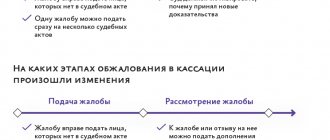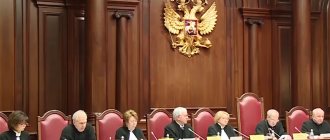The legal term “Appeal” means an appeal against judicial decisions that have not entered into legal force in civil or criminal proceedings.
The appeal can be complete or incomplete. A full appeal involves a complete review of the entire case from the beginning, in accordance with the rules provided for trial courts.
In case of an incomplete appeal, the case is reviewed solely on the basis of the arguments of the appeal.
Cassation (cassation appeal) is understood as an appeal, protest or reversal of a court verdict passed in a higher court.
CC: An appeal has no right to worsen the situation of the defendant without the initiative of the prosecution
The Constitutional Court issued Ruling No. 3271-O, which refused to consider at the hearing the request of the Voronezh Regional Court to verify the constitutionality of Part 1 of Art. 389.24 of the Code of Criminal Procedure of the Russian Federation, which provides that a conviction, ruling and decision of the first instance can be changed by the court of appeal in the direction of worsening the situation of the convicted person only at the initiative of the prosecution.
The appeal on its own initiative worsened the situation of the defendant
In October 2021, the Semiluksky District Court of the Voronezh Region convicted citizen Kh. under paragraph “b” of Part 2 of Art. 165 of the Criminal Code of the Russian Federation. The man was sentenced to two years of suspended imprisonment with a probationary period of one and a half years and on the basis of paragraph 3 of Part 1 of Art. 27 of the Code of Criminal Procedure of the Russian Federation was exempted from punishment due to the amnesty act.
The defense attorney appealed the verdict. Having established that the victim suffered real material damage, the judge of the Voronezh Regional Court came to the conclusion that there were grounds for classifying the crime as a more serious crime. On this basis, he overturned the verdict and returned the case to the prosecutor to remove obstacles to its consideration by the court.
Not only the lawyer, but also the deputy prosecutor of the Voronezh region appealed to the cassation court. The latter insisted that the appeal, contrary to paragraphs 16 and 17 of the Resolution of the Plenum of the Supreme Court of November 27, 2012 No. 26 “On the application of the norms of the Criminal Procedure Code of the Russian Federation governing proceedings in the appellate court,” made a decision that worsened the situation of the convicted person , although neither the prosecutor nor the victim asked for this.
The Presidium of the Voronezh Regional Court, during the consideration of the complaint and presentation, doubted the constitutionality of Part 1 of Art. 389.24 of the Code of Criminal Procedure as preventing the appellate court, which has seen grounds for changing the classification of the offense in a direction unfavorable for the convicted person, to overturn the verdict and return the case to the prosecutor in the absence of a presentation from the prosecutor or a complaint from the victim. In June 2021, the cassation suspended the proceedings and sent a request to the Constitutional Court of the Russian Federation.
The Constitutional Court protected the rights of the defendants
The Voronezh Regional Court asked to recognize Part 1 of Art. 389.24 of the Code of Criminal Procedure is inconsistent with the Constitution to the extent that it does not allow the appellate court to make a decision on its own initiative to return the criminal case to the prosecutor due to the presence of grounds for bringing a more serious charge.
The Constitutional Court recalled that the criminal procedural norms regulating the return of a criminal case to the prosecutor from the stage of consideration in the court of first instance, including the issue of turning the charge for the worse, have already been the subject of an assessment by the Constitutional Court.
Thus, the Resolution No. 16-P of July 2, 2013, in particular, states that the trial is carried out only on the charge brought, and changing the charge in the trial in the direction of worsening is not allowed. If the court discovers a procedural violation that prevents the consideration of the case, including due to the discrepancy between the classification of the crime and the circumstances specified in the indictment, then the restriction of the court’s right to choose the norm of criminal law to be applied or to return the case to the prosecutor makes the upcoming court decision dependent on the decision , the validity of which is precisely the subject of judicial review and which is accepted by the criminal prosecution authorities. The Court then concluded that such a restriction constituted an unlawful interference with the exercise of judicial power. The Constitutional Court recalled that it was in pursuance of this act in Art. 237 of the Code of Criminal Procedure, paragraph 6 appeared, according to which the court of first instance has the right to return the case to the prosecutor at the request of a party or on its own initiative if circumstances are identified that indicate the presence of grounds for classifying the actions of the accused as a more serious crime.
At the same time, criminal procedural legislation presupposes the inadmissibility of changing the charge in a direction that worsens the situation of the convicted person during appeal proceedings except by canceling the verdict by the appellate authority and sending the case to the prosecutor, the Constitutional Court recalled. This rule also applies to cases where factual circumstances indicate the presence of grounds for classifying the offense as a more serious crime.
According to the Court, the limits of the authority of the appellate authority to make decisions entailing the possibility of changing the charge in a direction that worsens the situation of the convicted person are predetermined by the fact that the appeal hearing of the case is possible only on the initiative of one of the parties. In a systematic connection with this order is the rule about the inadmissibility of a turn for the worse. The definition emphasizes that such a prohibition in relation to this stage means the impossibility of changing or canceling a sentence directly by a decision of the appellate instance on grounds unfavorable for the defendant based on his complaint or a complaint filed in his interests.
The said regulation, reflected in the contested norm, according to the Constitutional Court, is due to the need to ensure the rights to judicial protection, to appeal to the court against decisions of state bodies and to review a sentence by a higher court with adequate guarantees of their unhindered implementation in conditions of real freedom of appeal. “This freedom, among other things, presupposes that the defense has no reason to fear that the appeal procedure initiated by it will in one way or another lead to the adoption of a judicial act that worsens the position of the defendant in comparison with the act being appealed,” the Court emphasized.
The Constitutional Court believes that the presence of such fears would significantly complicate the defense’s decision to appeal a verdict that has not entered into legal force, causing a kind of “chilling effect” in the desire to exercise this right or even forcing it to refuse to exercise it.
The court proceeded from the fact that the risk of a possible change in the defendant’s position in an unfavorable direction for him after a review of the verdict carried out on his own complaint could become a factor preventing him from exercising his constitutional right to appeal the verdict and have his case considered by at least two courts. The definition emphasizes that the prohibition on a turn for the worse on the initiative of the appellate instance must also be observed in the event that the appellate instance cancels the verdict with the return of the criminal case to the prosecutor in connection with the establishment of grounds for classifying the act as a more serious crime, despite the fact that in this case such a prohibition not directly stated in the Code of Criminal Procedure.
The court recalled that it had previously said in its acts that the appellate authority has the right to overturn the verdict and return the criminal case to the prosecutor if there is a prosecutor’s submission or a victim’s complaint against the verdict, which initiated an appeal review of the case and which raised the question of the need to take into account an aggravating factor. punishment circumstances or about toughening the punishment of the convicted person, and therefore about worsening his situation. A similar position was taken by the Plenum of the Supreme Court in paragraph 16 of Resolution No. 26 of November 27, 2012. “Part one of Article 389.24 of the Code of Criminal Procedure cannot be regarded as allowing the appellate court to make, on its own initiative, a decision to cancel a decision not contested by the prosecutor, the victim or other participants in the proceedings , representing the prosecution, the verdict of the court of first instance and the return of the criminal case to the prosecutor on the grounds of the need to bring a more serious charge against the defendant,” the Court concluded.
An opposite interpretation would mean a significant restriction of the procedural guarantees of the right to judicial protection and appeal to the court against decisions of any government bodies, including judicial ones, as well as the right of everyone convicted of a crime to review the sentence by a higher court in the manner established by federal law, the Constitutional Court indicated.
Experts supported the Court's approach
Advisor to the law firm ZKS, Head of the Department of Criminal Law, Faculty of Law, National Research University Higher School of Economics, Professor, Doctor of Law. Gennady Esakov noted that in this ruling of the Constitutional Court, two opposing forces of the criminal process clashed quite harshly. “On the one hand, the independence of the court, which led, through the development of constitutional and legal practice, to vesting the court of first instance with powers to worsen the position of the accused on, let’s say, the initiative of the court itself. As is known, in the original version of the Code of Criminal Procedure the court of first instance did not have such powers, and only through the practice of the Constitutional Court did clause 6 of Part 1 of Art. appear in the Code of Criminal Procedure of the Russian Federation. 237 of the Code of Criminal Procedure of the Russian Federation,” the expert explained.
According to him, a logical development of this approach would be to allow the appellate court to use paragraph 6 of Part 1 of Art. 237 of the Code of Criminal Procedure of the Russian Federation on one’s own initiative. But at the same time, there is a general prohibition on worsening the defendant’s position on appeal without presenting a corresponding demand to the prosecution, added Gennady Esakov.
“Paradoxically, the Constitutional Court could choose either of the two approaches, since both can be justified with equal conviction by the constitutional text. The court chose the second one. Probably, he can be supported in this, which, however, does not exclude the possibility of changing the legislation in this part with the subsequent endowment of the appellate court with the right to use clause 6 of Part 1 of Art. 237 of the Code of Criminal Procedure of the Russian Federation on his own initiative,” he believes.
Moscow AP lawyer Valery Sarkisov, in turn, told AG that the definition does not have any serious significance for law enforcement practice, and the very fact of sending such a request indicates that the courts, unfortunately, do not always understand the meaning of criminal law. procedural regulation. “The Constitutional Court quite rightly indicated that the failure to grant the appellate court the right to return the criminal case to the prosecutor if there are grounds for qualifying the actions of the convicted person under an article providing for criminal liability for committing a more serious crime is explained by the fact that otherwise fears of worsening the situation of the convicted person would have been created due to the “chilling effect” of an obstacle for the defense to make a decision to appeal the verdict in the appellate instance,” said Valery Sarkisov.
What violations of the court can be appealed against?
- it was revealed that there are many contradictions in the criminal case;
- there are inconsistencies between the facts and the evidence presented by the prosecution in court;
- there is anecdotal evidence that was ignored by the miracle;
- the absence of some court records was revealed;
- the judge incorrectly interpreted the law of the Criminal Code of the Russian Federation, distorted reality or incorrectly interpreted the facts;
- obvious violations of the procedure for conducting a hearing, pre-trial process or investigation have been identified, and the applicant has irrefutable evidence of this fact;
- trials were conducted without the accused or the victim;
- the main witnesses in the criminal case were not heard or the legitimate reasons for terminating the proceedings were not taken into account;
- the sentence is too lenient or harsh;
- inadmissible evidence was taken into account or a number of facts were hidden;
- it was revealed that one of the witnesses provided deliberately false information, they were bribed, or there was influence on persons participating in the process;
- the verdict lacks explanations that would make it clear why certain facts were given importance and others were ignored;
- a lawyer did not participate in the process, although there was no refusal from the convicted person;
- any infringement of rights or other facts indicating that the rights of the defendant have been violated;
- circumstances indicate that the crime was classified incorrectly.
Contents of the appeal
Article 389.6 of the Code of Criminal Procedure of the Russian Federation contains requirements for the content of an appeal. The appeal must contain:
- the name of the appellate court to which the complaint or presentation is filed;
- information about the person who filed the appeal or presentation, indicating his procedural status, place of residence or location;
- an indication of the verdict or other court decision and the name of the court that decided or rendered it;
- arguments of the person who filed the appeal or presentation, indicating the grounds provided for in Article 389.15 of this Code;
- a list of materials attached to the appeal or submission;
- signature of the person filing the appeal or presentation.
Procedure for considering an appeal
Present at the meeting:
- three judges and a secretary;
- public prosecutor (prosecutor);
- convicted;
- advocate.
The hearing is held in full; if someone does not appear at the meeting, it is postponed to another day.
For samples and examples of other procedural documents, see the section “Samples of petitions in criminal cases”
Where and how to file an appeal
- If the sentence was passed in the magistrate’s court, then the application is addressed to the district court, but is submitted through the magistrate’s court.
- If the case was considered by the district court, then the appeal is filed to a higher court (regional or city), but through the court that issued the sentence.
You can send a complaint through the Russian Post, or through an expedition, sometimes the office for criminal cases of the court. If the convicted person is under arrest, then through a convoy, which will transfer the complaint to the special department of the pre-trial detention center, which in turn will send an appeal to the court. The day of filing the complaint will not be considered the day when it came to court, but when it was registered by the special department of the pre-trial detention center.
Deadlines for appeal and procedure for restoring a missed deadline
An appeal against a court verdict can be filed within 10 days from the date of the verdict (Article 389.4 of the Code of Criminal Procedure of the Russian Federation).
If the deadline for an appeal is missed for a good reason, persons who have the right to file an appeal or presentation may petition the court that passed the sentence or made another appealed decision to restore the missed deadline. The petition to restore the term is considered by the judge who presided over the court hearing in the criminal case, or by another judge (Article 389.5 of the Code of Criminal Procedure of the Russian Federation).
How to file a complaint
The drafting rules and requirements are prescribed in Article No. 389.6 of the Code of Criminal Procedure of the Russian Federation. A sample appeal in a criminal case is located below; you can write it by hand or on a computer.
Key points of the statement:
- Information about the court and information about the applicant are recorded. Indicates: the person’s status in the lawsuit and personal information.
- Provides information about the controversial decision that is subject to appeal.
- The grounds on which the judge should order a review of the case are recorded.
- Each statement must be supported by articles of the Criminal Code. Arguments are stated indicating that the application has good grounds for reconsideration.
- The list of documents and evidence provided is indicated.
Decisions made by the appellate court can only be appealed through cassation. An application to this court is drawn up in the same way as an appeal.
Submission deadlines and acceptance procedure
- If the defendant is detained and is in a pretrial detention center, the calculation of the term will begin after he is given a copy of the court verdict against signature.
- If the deadline for filing an appeal in a criminal case has expired, then a cassation appeal is filed.
The court is obliged to notify all participants in the criminal case that it is under appeal.
Along with the notice, a copy of the complaint and all documents attached to it will be sent so that interested parties can familiarize themselves with their contents. The notice must indicate the date on which the appeal hearing will take place. Having received such notice, each participant in the process has the right to write an objection to the complaint if he does not agree with the arguments set out in it.
Filing an appeal from relatives of the convicted person
The law does not give the right to file an appeal in a criminal case to relatives and witnesses, both on the part of the convicted person and on the part of the victim.
Our advantages
Experience
In 2021 - 2021 our lawyers did not lose a single case
Guarantees
Errors are excluded - we know “what” and “how” it takes to win
Price
Our prices are lower due to volume - pay in installments or in stages






